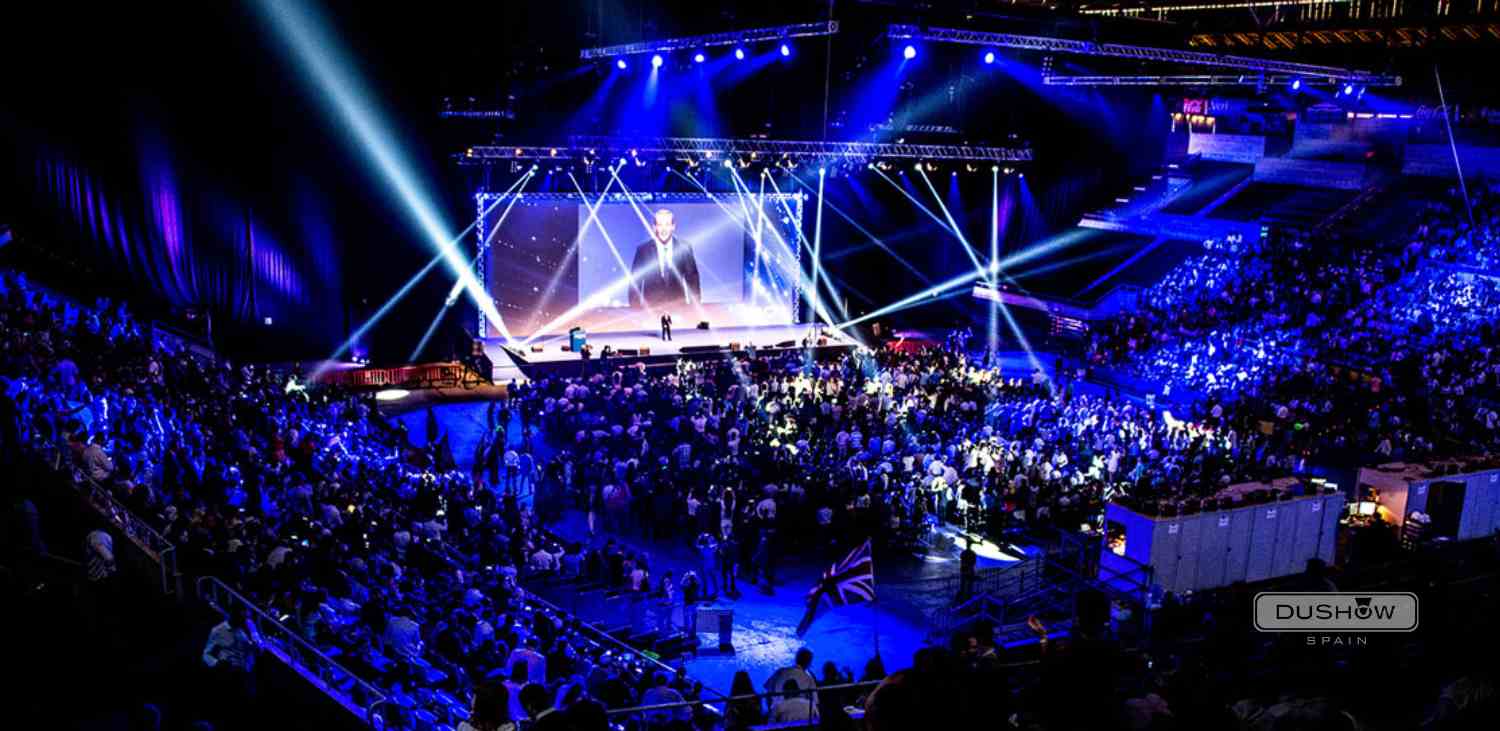Exactly How Event Production Works: A Comprehensive Look at the Process
Event production is a complex and structured procedure that calls for cautious planning and implementation. It starts with developing clear purposes and recognizing the target audience. Each step, from budgeting to location selection, plays a crucial role in ensuring success. As the process unravels, numerous aspects have to straighten seamlessly. The subtleties of this detailed operation typically go undetected. What are the vital phases that add to a memorable event?

The First Drawing Board
When beginning on event production, cautious preparation is important to guarantee an effective outcome. The first planning stage offers as the structure for all subsequent initiatives. Throughout this stage, event manufacturers have to specify the event's objective and goals plainly. Identifying the target audience helps tailor the experience and messaging, assuring significance and engagement.Producers have to likewise think about the event layout, whether it be in-person, virtual, or crossbreed, as this will certainly affect different logistical components. Selecting a suitable day and venue is critical, as it affects access and availability.Furthermore, constructing a reliable group is fundamental for separating responsibilities and simplifying communication. Establishing a timeline with turning points guarantees all jobs are completed on time. This phase entails thorough study, including identifying potential obstacles and creating strategies to mitigate dangers. Eventually, a well-structured preliminary preparation phase sets the tone for an effective event production journey.

Budgeting and Resource Allowance
In event production, efficient budgeting and resource allotment are important for success - event production charlotte. Establishing economic parameters establishes the foundation for all succeeding choices, while source distribution methods guarantee that every component of the event is adequately supported. With each other, these elements aid keep control over expenditures and enhance using readily available resources
Establishing Financial Parameters
Developing economic criteria is essential to the success of any kind of event production, as it sets the foundation for reliable budgeting and resource appropriation. This procedure starts with specifying the overall budget plan, which encompasses all elements of the event, including venue prices, catering, and marketing. By recognizing readily available funds, event coordinators can prioritize expenses and designate sources accordingly. In enhancement, it is essential to carry out complete marketing research to expect possible expenses and determine financing resources, such as sponsorships or ticket sales. Developing clear economic criteria additionally aids in threat management, allowing planners to reserve contingency funds for unanticipated expenses. Inevitably, a well-defined budget functions as a roadmap, directing the event production team towards attaining their goals while keeping financial control.
Resource Distribution Methods
Effective source circulation techniques are important for making best use of the impact of an event while sticking to budget constraints. Effective event production requires a meticulous strategy to budgeting and resource appropriation. Planners should prioritize important components such as location, event catering, and technology, making sure that funds are designated to areas that improve guest experience. A comprehensive budget plan must describe anticipated costs and identify locations for potential price savings, such as working out with suppliers or checking out sponsorship possibilities. Additionally, tracking expenses throughout the preparation procedure helps prevent overspending. By employing critical resource circulation, event manufacturers can supply a memorable experience while maintaining fiscal obligation, ultimately contributing to the overall success of the event.
Venue Option and Logistics
Selecting the best place is necessary to the success of any event, as it establishes the phase for the general experience. Location choice entails examining different elements, including capability, availability, and place. Organizers need to think about the target audience and the nature of the event, guaranteeing the venue aligns with the event's goals.Logistics play a considerable role in this procedure, involving arrangements for seats, audiovisual equipment, and providing solutions. A well-chosen location must help with smooth flow for participants and personnel, boosting engagement.Additionally, evaluating prospective places for facilities like car parking, bathrooms, and fire escape is very important for safety and security and ease. The timeline for securing the venue is additionally essential, as prominent locations might reserve rapidly - event production charlotte. Consequently, complete preparation and timely execution can ultimately add to a smooth event experience, making venue selection and logistics fundamental components of effective event production
Innovative Idea Advancement
While the location sets the physical phase, creative principle growth forms the event's identity and narrative. This procedure starts with determining the event's objective and target market, enabling event producers to formulate an engaging motif that reverberates with attendees. Brainstorming sessions often include varied point of views, fostering innovative concepts that line up with the event's goals.Once a theme is developed, aesthetic elements such as shade schemes, signage, and decor are made to improve the overall ambience. Storytelling techniques might also be integrated to create an interesting journey for individuals, ensuring a memorable experience. In addition, considerations concerning enjoyment, activities, and interactive parts are lined up with the chosen idea, enhancing the style throughout the event.Ultimately, effective imaginative idea development assurances that every aspect of the event functions cohesively, leaving a lasting perception on attendees and satisfying the event's purposes. This foundational work prepares for succeeding preparation and execution phases.
Collaborating With Vendors and Distributors
Successful event production rests on reliable collaboration with suppliers and suppliers. Choosing reliable companions, working out agreements effectively, and making certain timely deliveries are essential action in this process. Each of these elements adds substantially to the total success and smooth implementation of an event.
Choosing Reliable Allies
How can event planners guarantee a seamless production experience? Choosing trusted companions is essential in accomplishing this objective. Event organizers have to conduct extensive research study to recognize suppliers and distributors with a proven record of quality. This includes inspecting recommendations, examining profiles, and reviewing client comments. Coordinators need to focus on companions that show professionalism, prompt interaction, and a readiness to team up. Structure solid partnerships promotes depend on and makes it possible for fast analytic throughout the event. Additionally, it is valuable to pick regional site web vendors that recognize the place and local logistics. Inevitably, an effective event rests on the synergy in between organizers and their companions, making sure that every element of production runs smoothly and efficiently.
Bargaining Agreements Successfully
Reliable settlement of contracts is an important action in the partnership between event organizers and their suppliers and distributors. This procedure includes clear communication of assumptions, deliverables, and timelines. Coordinators should conduct detailed research study on market rates and market requirements to establish a standard for settlements. It is necessary to develop a collective ambience, encouraging open discussion regarding terms, pricing, and possible contingencies. Coordinators ought to likewise prioritize understanding the supplier's capabilities and constraints to align their needs properly. Versatility can cause equally valuable agreements, cultivating long-lasting connections. Crafting well-defined agreements that consist of certain efficiency metrics can assist assure responsibility, ultimately pop over to this web-site leading to effective event implementation and fulfillment for all parties included.
Making Sure Timely Shipments
Prompt distributions are important for the smooth implementation of any kind of event, calling for thorough collaboration between planners and their vendors and distributors. Effective interaction is important, as it aids establish clear expectations relating to distribution routines, amounts, and specific requirements. Organizers frequently produce thorough timelines to outline vital turning points, making sure all events continue to be aligned throughout the procedure. Normal check-ins with vendors can aid identify potential hold-ups early, permitting for proactive services. Additionally, building strong relationships with dependable providers promotes trust fund and liability, which can cause far better solution and prioritization. By prioritizing these collective efforts, planners can decrease disturbances, therefore boosting the general performance of event production and making certain that all essential products and solutions get here as intended.
Marketing and Promo Approaches
While arranging an event, the success of advertising and marketing and promotion approaches can considerably influence presence and engagement. Reliable techniques frequently include a mix of electronic advertising and marketing, standard marketing, and grassroots outreach. Utilizing social networks systems enables real-time communication and targeted marketing, getting to particular demographics successfully. Email advertising campaigns can better involve potential guests with tailored content and reminders.Collaborations with influencers or industry leaders can additionally improve credibility and broaden reach. Creating interesting content, such as video clips or blog sites, aids to generate buzz and endure rate of interest leading up to the event. Furthermore, leveraging early-bird discounts and special benefits can incentivize ticket purchases.Promoting via traditional channels, such as posters or local media, stays appropriate, especially in community-focused occasions. A complete method that incorporates multiple approaches guarantees maximum exposure and interaction, ultimately contributing to the event's success and the development find out of a memorable experience for attendees.
On-Site Execution and Administration
On-site execution and monitoring are important parts that determine the overall success of an event. Efficient coordination during the event assures that all components align with the prepared program. Event managers supervise logistics, including vendor coordination, tools setup, and guest solutions. Monitoring timelines and dealing with any unexpected issues are fundamental for keeping a smooth experience.The team plays a substantial duty, as experienced employees are in charge of numerous jobs such as registration, information circulation, and technological assistance. Interaction amongst group members is crucial; it promotes a collaborative environment and makes it possible for quick resolution of challenges.Additionally, safety and security procedures have to be stuck to, protecting the wellness of all participants. Post-event evaluations are additionally component of on-site monitoring, supplying understandings for future enhancements. By concentrating on these facets, event producers can create remarkable experiences that fulfill or surpass participant assumptions while accomplishing the event's purposes.
Regularly Asked Inquiries
Just how Do I Select the Right Event Motif?
Selecting the best event theme includes considering the target market, event function, and venue. Looking into present trends and collecting input from stakeholders can additionally inspire creative ideas that reverberate and develop an unforgettable experience.

What Are Usual Blunders in Event Production?
Usual errors in event production commonly include inadequate planning, bad interaction among staff member, budget plan mismanagement, neglecting to consider the target market's requirements, and falling short to carry out an extensive post-event examination for future enhancements.
Exactly How Can I Determine Event Success?
To determine event success, one can evaluate attendee contentment, interaction degrees, spending plan adherence, and post-event comments. Key performance indications, such as ticket sales and social media sites communications, likewise supply important understandings into overall performance.
What Should I Do if It Drizzles on the Event Day?
In the event of rain on the day, the coordinator must execute contingency plans, such as safeguarding tents or relocating activities inside. Interaction with participants about modifications is necessary to assure a smooth experience regardless of weather obstacles.
Exactly How Can I Guarantee Attendee Involvement During the Event?
